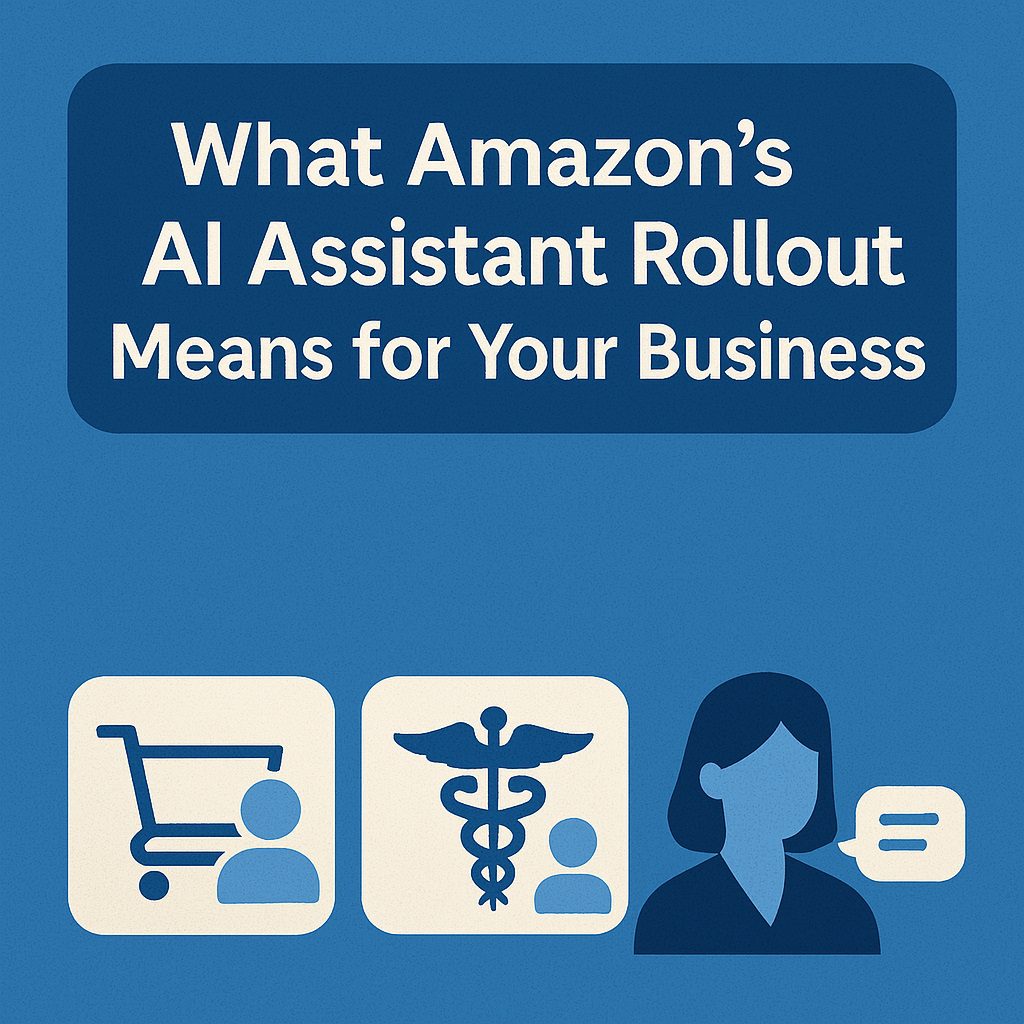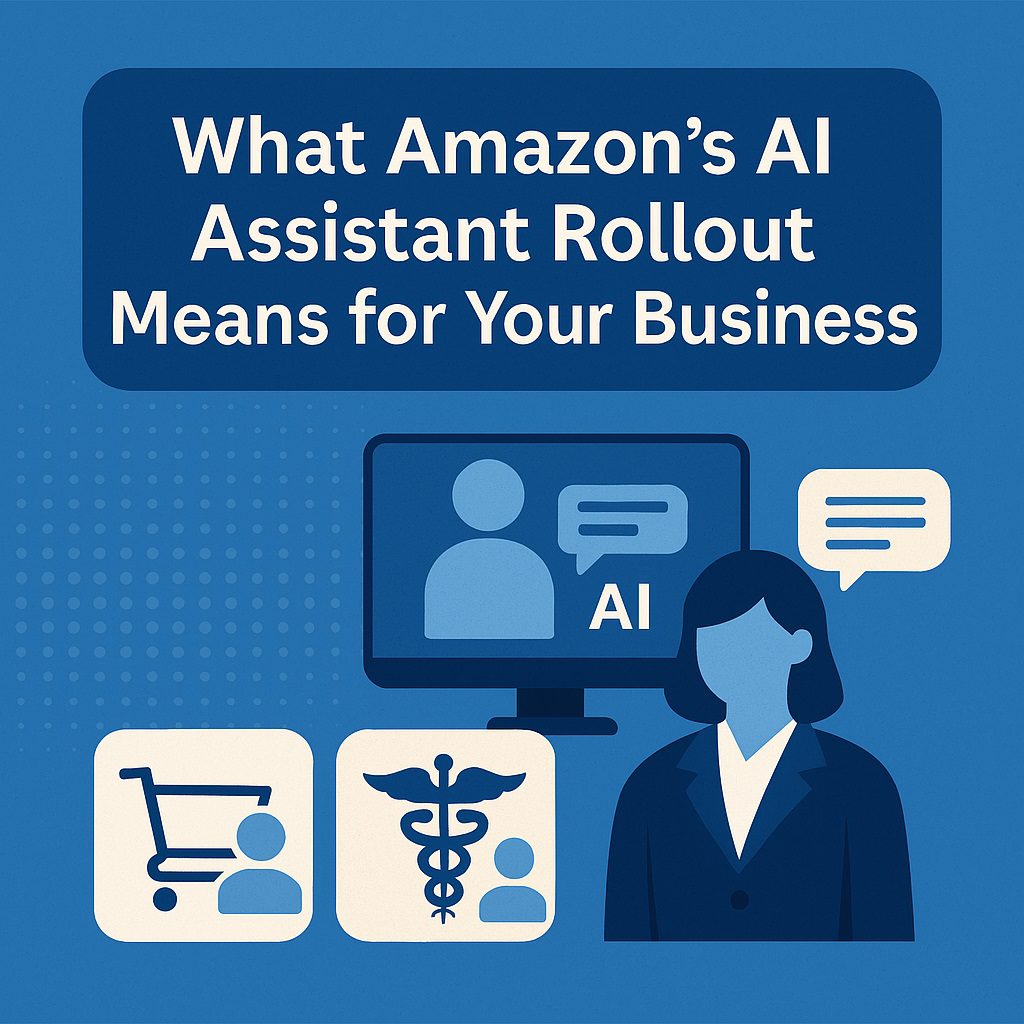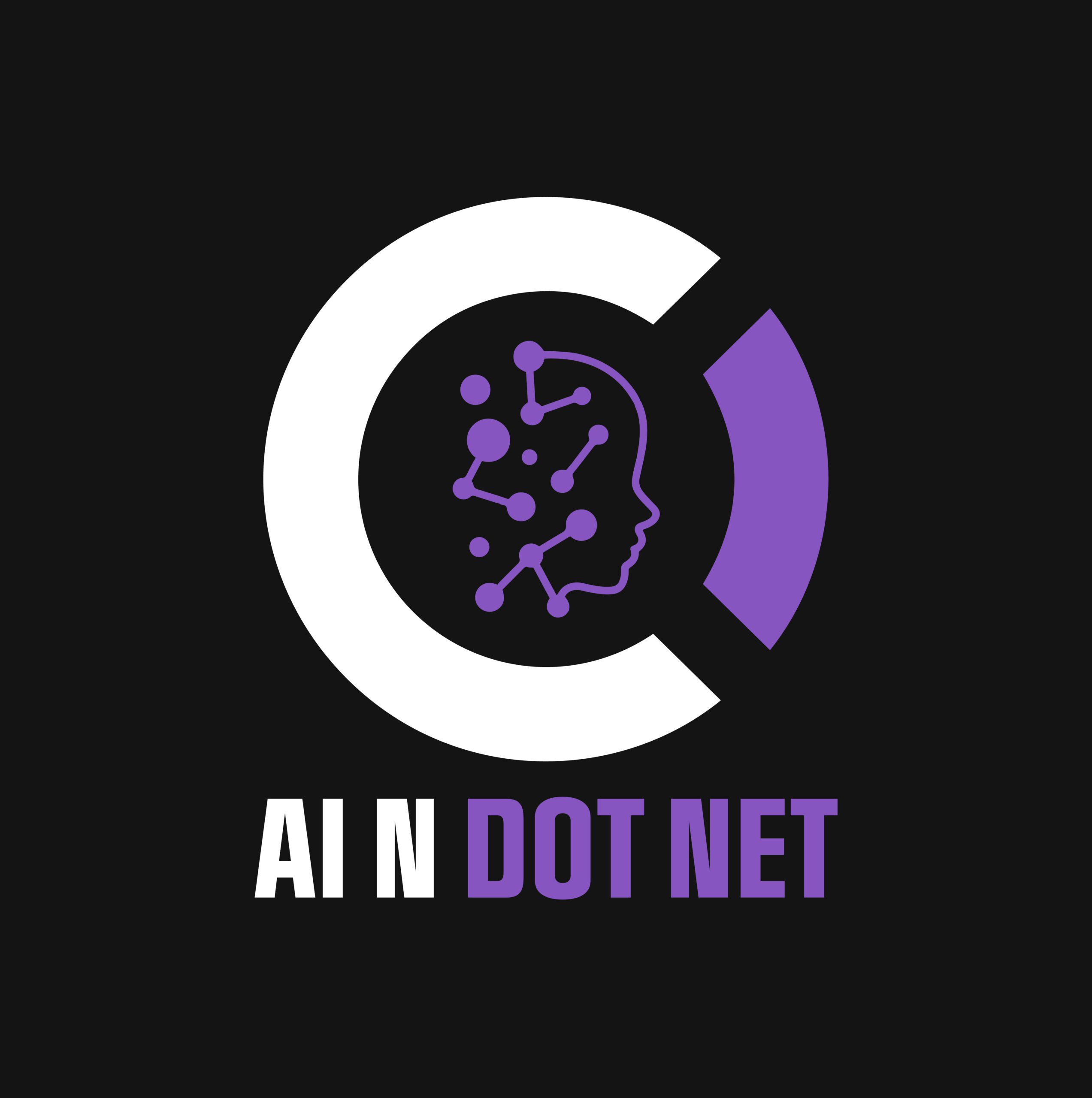A Case Study in Applied Generative AI for Medium to Large Organizations
Introduction: A Wake-Up Call for Practical AI
Amazon just launched a suite of next-generation AI assistants—each one solving a real-world problem with conversational intelligence.
This isn’t just about consumer gadgets.
It’s a case study in how large organizations can apply AI to simplify operations, improve user experience, and create scalable solutions.
In this article, we’ll explore:
- What Amazon’s new AI assistants actually do
- What lessons medium to large businesses and government agencies can draw from them
- How you can start projecting AI assistants into your own organization
Amazon’s AI Assistant Strategy: What They’re Doing
🛍️ 1. Shopping Assistant (“Interests”)
- Users describe what they want using everyday language.
- AI recommends products that fit the request.
- ✅ Key Insight: Transforms search into guided discovery.
Example prompt: “Looking for a gift for someone who loves hiking and minimalism.”
🏥 2. Health Assistant (In Testing)
- Answers health-related questions.
- Suggests relevant wellness products.
- ✅ Key Insight: Provides first-line support through domain-specific guidance.
Example prompt: “What can I take for seasonal allergies?”
🗣️ 3. Alexa+ (Generative AI Upgrade)
- New version of Alexa with memory, context, and multi-step task handling.
- Conversational, intelligent, and adaptive.
- ✅ Key Insight: AI evolves from reactive tool to proactive assistant.
The Case Study: Strategic Lessons from Amazon
🔄 1. AI is Integrated into Core Processes
Amazon didn’t build generic chatbots. They embedded AI into shopping, health, and home automation workflows.
Takeaway: Your AI assistant should do something, not just say something.
🧠 2. Generative AI Enables Smarter Conversations
These assistants handle context, reason through requests, and adapt dynamically.
Takeaway: Expect your AI to behave like a helpful colleague—not a vending machine.
⚠️ 3. Rollouts Come With Trade-offs
Alexa+ isn’t available on all devices. Backward compatibility is sacrificed for forward momentum.
Takeaway: Perfection is the enemy of progress. Start where the ROI is highest.
How to Project AI Assistants into Your Organization

Let’s shift focus.
If Amazon’s AI team built an assistant for your company—what would it do?
Here are real use cases for medium to large businesses and government agencies:
🏢 Internal Operations
- HR Assistant: Answer questions about PTO, reimbursements, or benefits.
- IT Helpdesk Bot: Automate password resets and troubleshooting.
- Policy Assistant: Help staff find internal procedures or documentation.
Prompt: “How do I submit a travel expense request?”
💬 Customer Support
- Tier 1 support bots to handle FAQs and route complex issues.
- Voice assistants for caller intake before live-agent handoff.
Prompt: “I need to reset my login but can’t remember my account number.”
📦 Procurement & Logistics
- Natural-language queries for inventory status, vendor history, or shipment tracking.
Prompt: “When is our next delivery from Vendor X scheduled?”
🏛️ Public Sector & Government
- Citizen Service Bots: Answer permit/license questions.
- Grant Application Assistants: Guide departments through eligibility and forms.
- Case Review AIs: Summarize documents, flag inconsistencies.
Prompt: “What forms are needed to apply for a business license renewal?”
Getting Started: From Inspiration to Execution
✅ Step 1: Identify High-Friction Tasks
Look for:
- Repeated questions
- Process bottlenecks
- Tasks requiring simple logic or form filling
🛠️ Step 2: Use Tools You Already Know

If your org uses Microsoft tech, you’re in luck:
- Power Platform + Azure AI = low-code rapid development
- ML.NET + Semantic Kernel = full-code flexibility
- Microsoft 365 Copilot = native integration with your daily workflow
👥 Step 3: Involve Your Best Employees
Your most experienced team members know the friction points. Let them shape what your AI assistant should do—and how it should respond.
Think of your assistant as a new hire. It needs onboarding, feedback, and refinement.
Conclusion: From Search to Smart Help
Amazon isn’t just making Alexa smarter.
They’re showing what’s possible when AI becomes a doer, not just a talker.
Now it’s your turn.
Ask yourself:
If your organization had an AI assistant—what would it do on Day One?
Need help planning or building an AI assistant for your team?
Let’s talk strategy, tools, and ROI. Contact us
Want to stay ahead in applied AI?
📑 Access Free AI Resources:
- Download our free AI whitepapers to explore cutting-edge AI applications in business.
- Check out our AI infographics for quick, digestible AI insights.
- 📖 Explore our books on AI and .NET to dive deeper into AI-driven development.
References
Amazon Launches ‘Interests’ AI shopping tool, Reportedly Testing Health Chatbot
Amazon is testing shopping, health assistants as it pushes deeper into generative AI
Alexa Plus is coming to almost every Echo — but your favorite skill might not make the cut
Disclaimer
We are fully aware that these images contain misspelled words and inaccuracies. This is intentional.
These images were generated using AI, and we’ve included them as a reminder to always verify AI-generated content. Generative AI tools—whether for images, text, or code—are powerful but not perfect. They often produce incorrect details, including factual errors, hallucinated information, and spelling mistakes.
Our goal is to demonstrate that AI is a tool, not a substitute for critical thinking. Whether you’re using AI for research, content creation, or business applications, it’s crucial to review, refine, and fact-check everything before accepting it as accurate.
Lesson: Always double-check AI-generated

